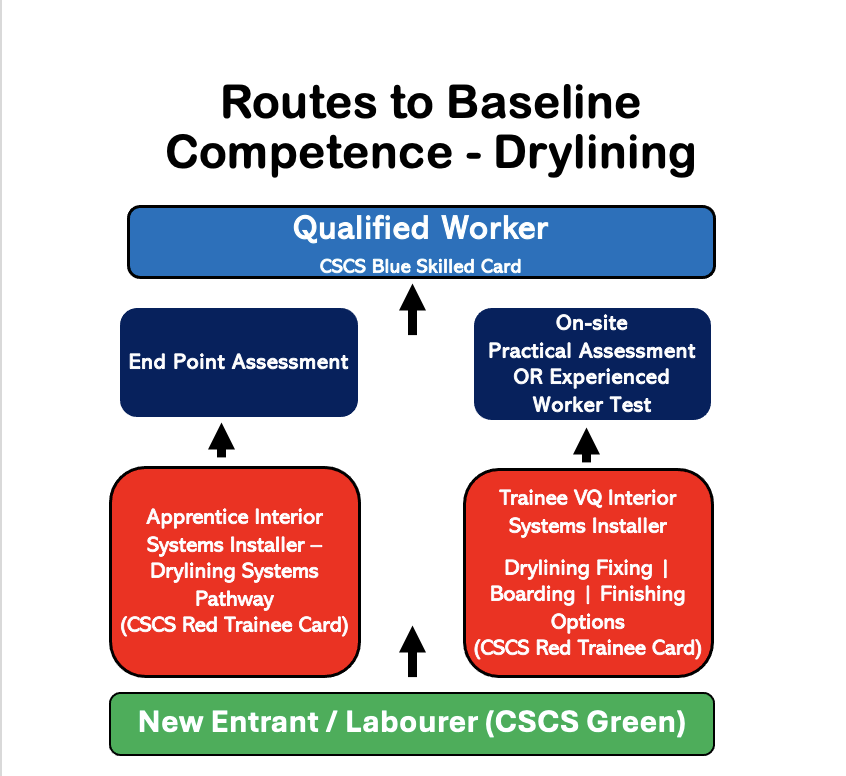Competence Framework for Drylining
Following the release of Dame Judith Hackitt’s final report in May 2018, the Competence Steering Group (CSG) was established to take forward the recommendations on competence within this report. As part of this work, our FIS competence framework for Drylining Installers supports demonstration of compliance.

Competence and your legal responsibility
The Building Safety Act became law in April 2022 and is the foundation of a new building safety regime for the construction and built environment sectors. The Act defines competence as having the appropriate skills, knowledge, experience and behaviours (SKEB), and requires all individuals carrying out design, construction and refurbishment work to be competent for their roles. This is not limited to Higher Risk Buildings, competence is now enshrined in the Building Regulations for all projects.
Organisations working on construction projects must also demonstrate that they have organisational capability and it is a legal requirement for anyone appointing an individual or organisation to ensure that they meet requirements. For further information and resources to support the implementation of a company wide competency plan, click here.
As part of this work Drylining was chosen as one of the six priority installation areas and FIS has led the work to establish a standard competency framework for drylining aligned to the new standards.
A Competency Framework for Drylining Installers
To support members and identify competence within their business, FIS has used this approach to demonstrate Installer competence for Drylining and compiled a Skills, Knowledge, Experience and Behaviour template. These are based on two pathways into the sector, an apprenticeship and the use of Vocational Qualifications. Supported by the FIS Skills Board and a number of working groups, FIS has now developed a SKEB Statement for Drylining.
Apprentice Standard
Interior systems installer / Institute for Apprenticeships and Technical Education
Recommended Qualification Structure for Interior Systems (Construction) Level 2
CITB
Dry Lining – Fixing
Dry Lining – Boarder
Dry Lining – Finishing
Dry Lining – Fire Resistant Walls
This ensures employers have a detailed and common understanding of the competence requirements for a Dryliner. The SKEB statement has been aligned to the apprenticeship standard and can now support delivery of Vocational Qualifications.
Download the Drylining SKEB (Skills, Knowledge, Experience and Behaviours) Statement
Help monitor competency with the FIS Professional Passport
The Building Safety Act mandates documentation of competence requirements for those involved in building design and construction. FIS has partnered with MyProPass to offer a tool for FIS members to manage and issue competency data for their workforce and provide individuals with a Competency Passport to demonstrate their training and achievement history.
FIS STEPs Vocational Knowledge Programme for Drylining
This e-learning programme helps apprentices and those working towards Vocational Qualifications in Drylining to meet the Knowledge Requirements for their VQ and Apprenticeship. Developed with CITB support and subsidised through the FIS, it is aligned with the Apprenticeship Syllabus and allows for progress monitoring by both the candidate and mentor.
Career and Competency Pathways
This work has been framed in a wider template for the FIS Recommended Career and Competency Pathway for Drylining:
More on The Competency Steering Group
The Competency Steering Group was created to develop competency frameworks and accreditation pathways for professions and trades involved in the design, construction, operation, maintenance, and refurbishment of buildings. The group identified 12 specialisms and created a working group for each of them. FIS supported Working Group 2, which focused on installation and maintenance work. The Competency Steering Group consisted of hundreds of professionals and tradespeople, and aimed to ensure all in the supply chain have a clear understanding of competency to create safer buildings.
In September 2020, CSG released Setting the Bar – a new competence regime for building a safety future which included recommendations from WG2 (pages 54 – 60).
A requirement identified within the Setting the Bar report was to identify any SKEB needed for working within a Higher-Risk Building (HRB). Whilst developing the competence frameworks, the priority occupations noted that there is very little difference between work carried out in a non-HRB and an HRB; however, where there are differences, these have been identified within the competence frameworks.
Guide to creating your Competency Management Plan
Changes to the regulatory environment in construction have renewed the focus on individual competency for all roles in our supply chain and organisational capability. To support compliance and help raise standards in the supply chain FIS has developed a Competency Management Plan for the sector and template tools to support companies in meeting these requirements.
Ongoing work
This work continues to evolve and there is a detailed implementation plan that involves communication and developing wider supporting resources such as the FIS Guide to Creating a Competency Management Plan and FIS Professional Passports. If you have feedback on the Drylining template, please do get in touch and we will be happy to explore further.
FIS is developing this this approach for other occupations:
Ceilings

SFS

Operable Walls

Partitions

If you would like to be involved in this work or join the wider FIS Skills Board, please email beenanana@thefis.org
Wider Competency Work
A new competence framework that applies to the management of projects in the built environment has been launched led by the Association for Project Management (APM)
A new competence framework that applies to the installation of Passive Fire Protection has been launched led by the Association of Specialist Fire Protection (ASFP)
FIS has a dedicated team to support your training needs and competency plans
For advice on process or funding for getting yourself or your workforce qualified view our Skills and Funding page contact the FIS Team on 0121 707 0077 or email info@thefis.org

